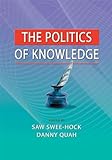The Politics of Knowledge / ed. by Swee-Hock Saw, Danny Quah.
Material type: TextPublisher: Singapore : ISEAS Publishing, [2009]Copyright date: ©2009Description: 1 online resource (228 p.)Content type:
TextPublisher: Singapore : ISEAS Publishing, [2009]Copyright date: ©2009Description: 1 online resource (228 p.)Content type: - 9789812309259
- 9789812309334
- HM651 .L74 2009
- online - DeGruyter
| Item type | Current library | Call number | URL | Status | Notes | Barcode | |
|---|---|---|---|---|---|---|---|
 eBook
eBook
|
Biblioteca "Angelicum" Pont. Univ. S.Tommaso d'Aquino Nuvola online | online - DeGruyter (Browse shelf(Opens below)) | Online access | Not for loan (Accesso limitato) | Accesso per gli utenti autorizzati / Access for authorized users | (dgr)9789812309334 |
Frontmatter -- CONTENTS -- LIST OF TABLES -- LIST OF FIGURES -- THE CONTRIBUTORS -- PREFACE -- FOREWORD -- MESSAGES -- Chapter 1. Role of Knowledge in the Transformation of Asia -- Chapter 2. Understanding the Politics of Knowledge: The Asian Perspective -- Chapter 3. Truth, Free Speech and Knowledge: The Human Rights Contribution -- Chapter 4. Knowledge: The Driver of Economic Growth -- Chapter 5. Commerce vs the Common Conflicts over the Commercialisation of Biomedical Knowledge -- Chapter 6. A Global Deal on Climate Change -- Chapter 7. The Changing Politics of Religious Knowledge in Asia: The Case of Indonesia -- Index
restricted access online access with authorization star
http://purl.org/coar/access_right/c_16ec
The publication of this book, comprising chapters written by distinguished scholars, is a timely recognition that these days we are bombarded by suggestions that knowledge is power, that we are operating in a knowledge economy, and that the greatest driver for financial growth and national development is the knowledge industry. There are more sources of knowledge available to a wider range of the world’s population than ever before. The Internet has made the dissemination of knowledge possible in ways not contemplated fifty years ago. National boundaries are crossed with consummate ease. Knowledge is not like other assets. It can be accessed rapidly and used by thousands, often millions, of people. This makes knowledge as an asset that generated much of the wealth in the early development of most nations. And different countries and regions need different strategies to support and promote the growth of their knowledge economies. These call for nationally and regionally-based approaches, and they entail new dynamics and challenges in wealth creation, legal regulation, national and social organization and the protection of environmental and natural resources.
Mode of access: Internet via World Wide Web.
In English.
Description based on online resource; title from PDF title page (publisher's Web site, viewed 01. Dez 2022)


